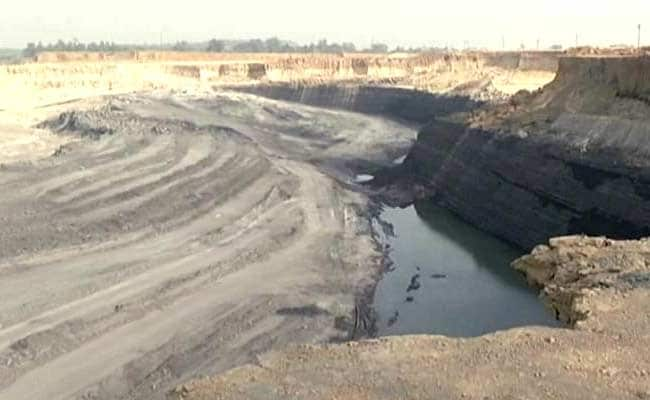With one of the largest coal reserves in Asia and over 10 coal-based power plants Chhattisgarh's Korba district is known as one of the power hubs of India.
Korba:
As India sets ambitious targets for moving towards renewable energy, most of its power still comes from other sources not just at the risk of climate but often jeopardising public health.
With one of the largest coal reserves in Asia and over 10 coal-based power plants Chhattisgarh's Korba district is known as one of the power hubs of India. But by government agency Central Pollution Control Board's own data, Korba is also the fifth most critically polluted industrial areas in India.
People living near the plant have been breathing a toxic cocktail of fumes every day for years now. A resident of a slum near Balco plant in Korba said, "Kids suffer from perennial cough and cold. Tuberculosis has become common. The water is contaminated, it turns red on boiling."
A family of three which shares a wall with the cooling towers of the Balco plant in Korba says, "The plant releases steam and our skin becomes sticky, there is a huge risk of skin diseases." They add that law requires the company to develop a green belt 100 metres around the plant and there house is just 10 meters away.
Coal plants in Korba generate over 200 lakh tones of highly polluting fly ash annually, according to Centre for Science and Environment.
Environment ministry requires all plants across the country to dispose 100 per cent of this discharge, a mandate that is openly violated in Korba, locals allege.

"Country will continuously evolve better emission standards as new technologies come and we have brought a electricity amendment act before parliament which I do hope this session will approve which will provide for higher penalties," said Coal Minister Piyush Goyal when asked if the government would come up with stricter norms considering the environmental and health damage cause by coal.
The rush at a local paediatrician confirms the damaging health effects of coal pollution. Dr SK Agarwal, says, "Pollution here has become worse due to which frequency of doctor visits have gone up."
Dr Dhruv Banerjee, a local pathologist says, "There has been a definite increase in cases of blood cancer which might have to do with ash and particulate discharge from coal plants in Korba."
According to a Greenpeace study, the particulate matter pollution from coal fired plants in India killed 1,15,000 people and led to over 20 million cases of asthma in 2011-12.
"I think it comes down to two things. Number one, is whether there will be a clear signal and a turning point that the world is shifting to clean energy, bringing down emissions or not; and number two, the money - who is going to pay for the most vulnerable countries to deal with the impacts from climate change that are already happening and are going to get worse," said Jennifer Morgan, Global Director of the Climate Program of the World Resources Institute.
With one of the largest coal reserves in Asia and over 10 coal-based power plants Chhattisgarh's Korba district is known as one of the power hubs of India. But by government agency Central Pollution Control Board's own data, Korba is also the fifth most critically polluted industrial areas in India.
People living near the plant have been breathing a toxic cocktail of fumes every day for years now. A resident of a slum near Balco plant in Korba said, "Kids suffer from perennial cough and cold. Tuberculosis has become common. The water is contaminated, it turns red on boiling."
A family of three which shares a wall with the cooling towers of the Balco plant in Korba says, "The plant releases steam and our skin becomes sticky, there is a huge risk of skin diseases." They add that law requires the company to develop a green belt 100 metres around the plant and there house is just 10 meters away.
Coal plants in Korba generate over 200 lakh tones of highly polluting fly ash annually, according to Centre for Science and Environment.
Environment ministry requires all plants across the country to dispose 100 per cent of this discharge, a mandate that is openly violated in Korba, locals allege.

Coal plants in Korba generate over 200 lakh tones of highly polluting fly ash annually, according to Centre for Science and Environment
"Country will continuously evolve better emission standards as new technologies come and we have brought a electricity amendment act before parliament which I do hope this session will approve which will provide for higher penalties," said Coal Minister Piyush Goyal when asked if the government would come up with stricter norms considering the environmental and health damage cause by coal.
The rush at a local paediatrician confirms the damaging health effects of coal pollution. Dr SK Agarwal, says, "Pollution here has become worse due to which frequency of doctor visits have gone up."
Dr Dhruv Banerjee, a local pathologist says, "There has been a definite increase in cases of blood cancer which might have to do with ash and particulate discharge from coal plants in Korba."
According to a Greenpeace study, the particulate matter pollution from coal fired plants in India killed 1,15,000 people and led to over 20 million cases of asthma in 2011-12.
"I think it comes down to two things. Number one, is whether there will be a clear signal and a turning point that the world is shifting to clean energy, bringing down emissions or not; and number two, the money - who is going to pay for the most vulnerable countries to deal with the impacts from climate change that are already happening and are going to get worse," said Jennifer Morgan, Global Director of the Climate Program of the World Resources Institute.
Track Latest News Live on NDTV.com and get news updates from India and around the world

